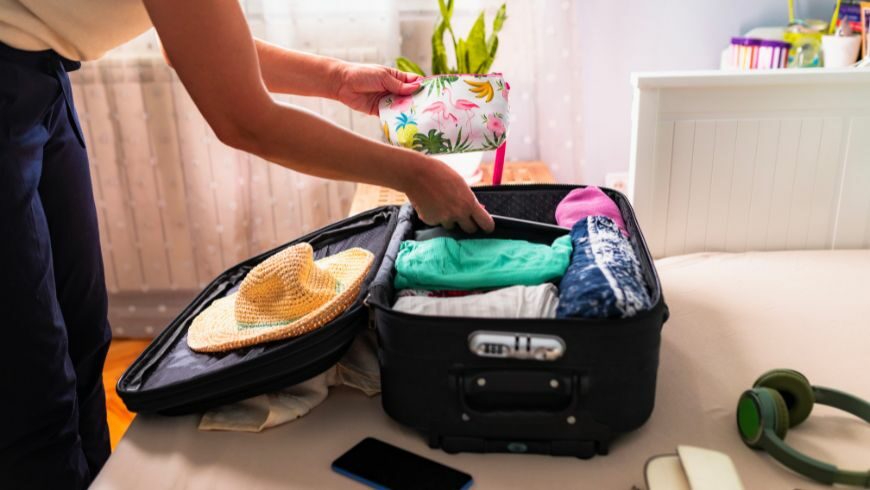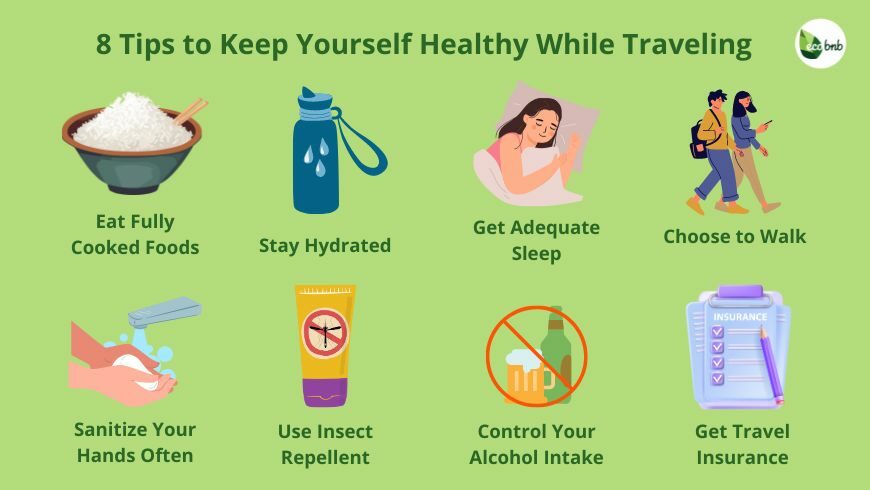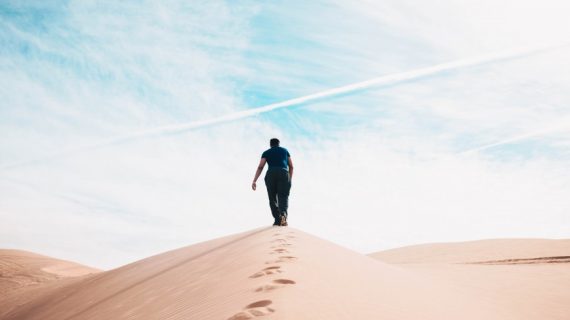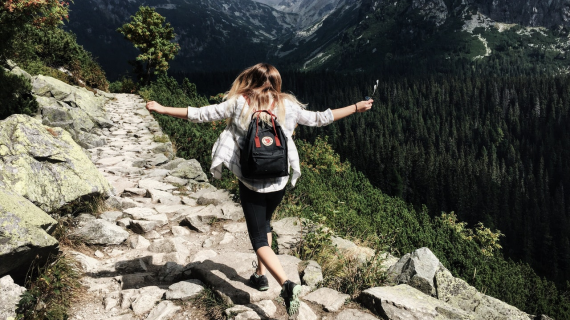Imagine getting sick in an unfamiliar place with little to no people who can speak and understand your language. Fortunately, there are several ways to avoid this situation and prevent illness during your trip. Discover eight tips for keeping yourself healthy while traveling.
Pre-Trip Preparation

It’s hard to keep a cool head and contain anxiety and fear during emergencies — but even more so if you’re in a remote village you’ve never been to. Here’s a quick pre-travel checklist to help you prepare before leaving home:
- Research destination-specific health risks: Know what potential dangers you could face by checking the latest health updates in your destination. You’ll know what diseases to watch out for and how to avoid them.
- Begin adjusting your sleep: Three days before jetting off, start sleeping an hour earlier or later to match your destination’s bedtime until your body gets used to the change.
- Call your insurance provider: Check information about coverage while you’re away.
- Visit your doctor: Some people insist on flying even with a mild fever, but it’s best to avoid this. It only increases your risk of thrombosis, aggravates your illness and compromises others’ safety. Confirm you don’t have a fever, and check with your doctor if necessary to ensure you’re illness-free before boarding.
- Pack a mini health kit: Gather first-aid items, such as pain relievers, bandages, supplements, hand sanitizers, cold packs and a thermometer.
Tips to Keep Yourself Healthy While Traveling

After securing the pre-trip essentials, follow these tricks to care for yourself while on the road:
1. Eat Fully Cooked Foods
Nutritious foods are your natural remedy to ease the impact of shifting time zones on your body and immunity.
Traveling disrupts your usual routines. The time difference alters your sleep pattern. Additionally, relocating from one hotel to another frequently can deprive you of physical activities, weakening your immune system. Rely on food to help make up for these deficiencies.
Though you may need to pay extra, seeking out healthy, cooked and hot menus is worth the added cost. Avoid raw foods — they can be contaminated or improperly prepared, increasing your risk of traveler’s diarrhea.
2. Stay Hydrated
Flying can dehydrate the body. Moreover, if the next place on your itinerary is a sunny paradise, you’ll need enough fluids to replenish your body.
Mild to moderate dehydration can cause fatigue, dizziness, muscle cramps, headaches, dry cough and low blood pressure. A severe case can lead to fainting.
Bring a water bottle anywhere you go to increase your fluid intake. If you’re going on a hike or will be walking a lot, drink one liter of water every two hours to replace the lost fluids through sweat. Remember to drink even if you’re not feeling thirsty. In some cases, you can also stop by restaurants to ward off dehydration — some establishments provide complimentary water.
3. Get Adequate Sleep
People typically have an optimal sleep period or circadian window of around 11 p.m. to 7 a.m. However, moving to another time zone can interrupt this body clock, leading to deprivation that lasts days or weeks. Consider taking up to 10 milligrams of melatonin supplements to encourage the body to produce more sleeping hormones at night.
4. Choose to Walk
If the location is within walking distance, skip the transportation and take the opportunity to exercise your calves. Since the gym membership is gone, be strategic about incorporating movement into your routine. Walking is a free way to keep your whole body active. It’s good for both your health and the environment.
5. Sanitize Your Hands Often
Whether by washing or using sanitizer, cleaning your hands frequently while traveling is critical. You’ll be out of your accommodation most of the time, visiting places, shaking people’s hands, exchanging money and tapping surfaces others have touched.
Your hands carry thousands of viruses and bacteria that can enter the body, attack the immune system and cause common cold, influenza and illnesses. Protect yourself by washing regularly with soap and water. Alternatively, rub your hands together with at least 60% alcohol-based sanitizer. This quick and easy hygiene protocol can significantly lower your risk of getting ill.
6. Use Insect Repellent
Malaria, dengue and Lyme are all serious yet preventable vector-borne diseases, accounting for more than 700,000 deaths annually. Tropical and subtropical areas have the highest cases of insect bites. If your next stop is a warmer country, habitually apply insect repellent to protect yourself from mosquitoes, ticks and other bugs.
7. Control Your Alcohol Intake
There’s no reason to skip a bottle of beer during your holiday. However, stop before getting intoxicated, as excessive alcohol is a recipe for all types of troubles. For instance, two Americans were discovered sleeping in the Eiffel Tower after being drunk all night. They were initially charged with trespassing a cultural site, but the fine was dismissed since no damage was found.
Many tourists have had worse accidents and injuries under the influence. To protect your health and safety, consider limiting or abstaining from alcoholic beverages while traveling.
8. Get Travel Insurance
Travel insurance is nonnegotiable for tourists. It’s not only for lost baggage, cancellations or flight delays. Companies offer a range of services from telemedicine to medical care, covering hospital expenses your primary health insurance doesn’t. Travel insurance is an affordable way to ensure another layer of protection in case you get sick.
Keep Yourself Healthy While Abroad
Avoid hospitals and unexpected bills by being more conscious of your health in a foreign land. Eat fully cooked foods, stay hydrated, get enough rest and move. The above lifestyle tricks and tips can help you dodge getting sick. That way, you can enjoy your trip to the fullest — the way it should be.

Author bio: Jack Shaw is the senior editor for Modded Magazine. Driven by his passion for writing, Jack loves to traverse the world, travel and explore the unknown. He has over six years of experience writing professionally and loves engaging in new projects. His works have been published in The Travel Magazine, EcoHotels, Trekaroo and more.




